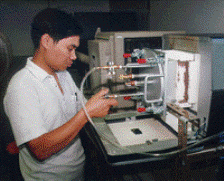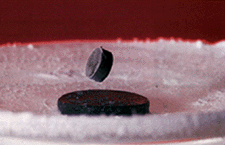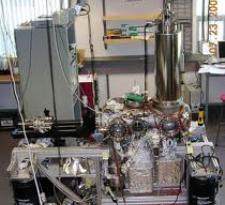 At the heart of our research program is materials development, as sample growth and characterization are key to our fundamental physics efforts. We have three laboratories devoted to materials: a solid state chemistry lab, a thin film lab, and a characterization lab featuring both a SQUID magnetometer and a Physical Properties Measurement System. Other materials facilities within AMPEL include a fully outfitted cleanroom and an X-ray crystallography lab. The materials aspect of our research affords students an opportunity to become involved in the chemistry as well as the physics of materials.
At the heart of our research program is materials development, as sample growth and characterization are key to our fundamental physics efforts. We have three laboratories devoted to materials: a solid state chemistry lab, a thin film lab, and a characterization lab featuring both a SQUID magnetometer and a Physical Properties Measurement System. Other materials facilities within AMPEL include a fully outfitted cleanroom and an X-ray crystallography lab. The materials aspect of our research affords students an opportunity to become involved in the chemistry as well as the physics of materials.
 Our work on high-Tc superconductors focuses mainly on measuring the intrinsic properties of these materials in order to better understand the nature of the superconducting state and the pairing mechanism. We employ a wide range of magnetic (moun spin resonance, precision magnetization measurements, magneto-optic imaging) and microwave measurements (penetration depth, surface resistance, non-linear effects) to probe the superconducting state of our crystals, and collaborate with researchers worldwide in order to take advantage of a wide range of experimental techniques (PSI, LNCMI).
Our work on high-Tc superconductors focuses mainly on measuring the intrinsic properties of these materials in order to better understand the nature of the superconducting state and the pairing mechanism. We employ a wide range of magnetic (moun spin resonance, precision magnetization measurements, magneto-optic imaging) and microwave measurements (penetration depth, surface resistance, non-linear effects) to probe the superconducting state of our crystals, and collaborate with researchers worldwide in order to take advantage of a wide range of experimental techniques (PSI, LNCMI).
 We have recently built a state-of-the-art facilty in which we will make extensive use of scanning probe microscopy (SPM) techniques including atomic force microscopy (AFM) and scanning tunnelling microscopy (STM) in ultrahigh vacuum (UHV) and at low temperatures (~5K). This clean, low-temperature environment allows the characterization of well defined systems, with sufficiently high energy resolution for most organic and nanoscale systems of interest, and with the level of stability required to achieve measurements on individual nanostructures.
We have recently built a state-of-the-art facilty in which we will make extensive use of scanning probe microscopy (SPM) techniques including atomic force microscopy (AFM) and scanning tunnelling microscopy (STM) in ultrahigh vacuum (UHV) and at low temperatures (~5K). This clean, low-temperature environment allows the characterization of well defined systems, with sufficiently high energy resolution for most organic and nanoscale systems of interest, and with the level of stability required to achieve measurements on individual nanostructures.
 At the heart of our research program is materials development, as sample growth and characterization are key to our fundamental physics efforts. We have three laboratories devoted to materials: a solid state chemistry lab, a thin film lab, and a characterization lab featuring both a SQUID magnetometer and a Physical Properties Measurement System. Other materials facilities within AMPEL include a fully outfitted cleanroom and an X-ray crystallography lab. The materials aspect of our research affords students an opportunity to become involved in the chemistry as well as the physics of materials.
At the heart of our research program is materials development, as sample growth and characterization are key to our fundamental physics efforts. We have three laboratories devoted to materials: a solid state chemistry lab, a thin film lab, and a characterization lab featuring both a SQUID magnetometer and a Physical Properties Measurement System. Other materials facilities within AMPEL include a fully outfitted cleanroom and an X-ray crystallography lab. The materials aspect of our research affords students an opportunity to become involved in the chemistry as well as the physics of materials. Our work on high-Tc superconductors focuses mainly on measuring the intrinsic properties of these materials in order to better understand the nature of the superconducting state and the pairing mechanism. We employ a wide range of magnetic (moun spin resonance, precision magnetization measurements, magneto-optic imaging) and microwave measurements (penetration depth, surface resistance, non-linear effects) to probe the superconducting state of our crystals, and collaborate with researchers worldwide in order to take advantage of a wide range of experimental techniques (PSI, LNCMI).
Our work on high-Tc superconductors focuses mainly on measuring the intrinsic properties of these materials in order to better understand the nature of the superconducting state and the pairing mechanism. We employ a wide range of magnetic (moun spin resonance, precision magnetization measurements, magneto-optic imaging) and microwave measurements (penetration depth, surface resistance, non-linear effects) to probe the superconducting state of our crystals, and collaborate with researchers worldwide in order to take advantage of a wide range of experimental techniques (PSI, LNCMI). We have recently built a state-of-the-art facilty in which we will make extensive use of scanning probe microscopy (SPM) techniques including atomic force microscopy (AFM) and scanning tunnelling microscopy (STM) in ultrahigh vacuum (UHV) and at low temperatures (~5K). This clean, low-temperature environment allows the characterization of well defined systems, with sufficiently high energy resolution for most organic and nanoscale systems of interest, and with the level of stability required to achieve measurements on individual nanostructures.
We have recently built a state-of-the-art facilty in which we will make extensive use of scanning probe microscopy (SPM) techniques including atomic force microscopy (AFM) and scanning tunnelling microscopy (STM) in ultrahigh vacuum (UHV) and at low temperatures (~5K). This clean, low-temperature environment allows the characterization of well defined systems, with sufficiently high energy resolution for most organic and nanoscale systems of interest, and with the level of stability required to achieve measurements on individual nanostructures.